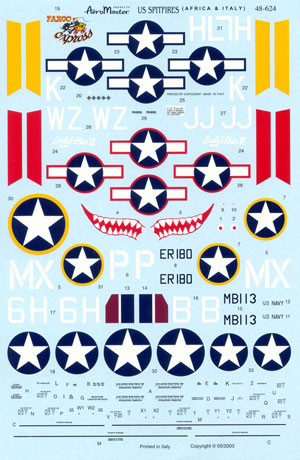S u m m a r y
|
| Catalogue
Number: |
AMD 48-624 - US Spitfires
Africa and Italy |
| Scale: |
1/48 |
| Contents and Media: |
Waterslide decals |
| Price: |
USD$9.00 MSRP from
Aeromaster's website |
| Review Type: |
FirstLook |
| Advantages: |
Unusual markings for
Spitfires; crisply printed; perfect register; good instructions. |
| Disadvantages: |
|
| Recommendation: |
Recommended |
Reviewed
by Rodger Kelly

Aeromaster's 1/48 scale
US Spitfires Africa and Italy is available
online from Squadron.com
Looking for some
different markings to apply to your Spitfires?
This sheet from AeroMaster
Products will supply them for you. Sheet 48-624 is amongst the new
batch of decals recently released from AeroMaster. It gives you
markings for four different mark Supermarine Spitfires wearing USAAF
markings during WWII.
 First
machine is ER180, a Mk Vc (Trop) of the 307th Fighter
Squadron. Camouflage scheme is dark earth/middle stone over azure
blue with a white spinner. The supplied markings consist of: First
machine is ER180, a Mk Vc (Trop) of the 307th Fighter
Squadron. Camouflage scheme is dark earth/middle stone over azure
blue with a white spinner. The supplied markings consist of:
-
Early white star on
blue circle with yellow surround US national insignia in four
places.
-
A red and white
shark mouth and eyes for the nose with a smaller set of eyes for the
cannon barrels. The shark mouth is a two-part decal to ease
placement.
-
White MX P squadron
codes.
- Black ER180 serial.
Next is MB113, a Seafire IIc
of the Royal Navy's Force H that wore bogus US markings for Operation
Torch in November 1942. Camouflage scheme is extra dark sea grey/dark
slate grey over sky with a red spinner. Markings consist of:
The third machine is "FARGO
Express" a MK VIII (no serial given) flown by Captain Leland P
Holland of the 308th Fighter Squadron, 31st Fighter Group out of
Castel Volturno, Italy in February/March 1944. Camouflage scheme is
dark earth/middle stone over azure blue with a red spinner.
-
The supplied
markings consist of: the later style Star and Bar US national
insignia in four places.
-
White HL K squadron
insignia.
-
"FARGO Express"
nose art.
-
A scoreboard
consisting of five black swastikas and a single white swastika.
- Yellow band theatre
markings for the upper and lower surfaces of the each wing.
The final aircraft is MH894
"Lady Ellen III", a Mk IX of the 309th Fighter Squadron, 31st
Fighter Group. Camouflage is dark green/ocean grey over medium sea
grey with a red spinner. The spinner back plate is either sky or
natural metal. Markings consist of:
-
Red bordered US star
and bar insignia in four places.
-
White WZ JJ squadron
codes.
-
White "Lady Ellen
III" scripts.
-
A white rectangle
with that lists the pilot's and ground crew's names in black.
-
An unusually small
black MH894 serial that is applied in an equally unusual position
for Spitfires – on the top of the fin.
-
Theatre markings for
the wings, this time in red.
A single set of comprehensive
set of stencil data is also supplied. These stencils look like the
same ones that AeroMaster has previously supplied as a separate
sheet. Sufficient markings are supplied to produce each and every
option on the sheet. The Placement guide is a little different from
AeroMaster's normal practice in that provides a fairly comprehensive
discourse on the general colour schemes worn by the Spitfire whilst it
was used by 31st Fighter Group – a good move AeroMaster. The
placement sheet and decals come packed in a clear plastic zip-loc
bag.
The references quoted are
American Spitfires Part I and Part II (or to give them their correct
title, American Spitfire Camouflage and Markings Part I and Part II)
by Paul Ludwig and Malcolm Laird. These are Ventura Publications out
of New Zealand. If you have only a passing interest in Spitfires
flown by the USAAF these two books are worth tracking down.
The decals themselves have
been printed by Cartograf. The decals are beautifully printed and in
perfect register. Cartograf decals can be a bear to use. They are
definitely not as user friendly as those produced by Microscale.
Persistence is the key note with Cartograf decals. That, coupled with
copious settling agent and a sharp pin will ensure that you end up
with the desired solution.
The recommended kits are the
Hasegawa, Tamiya and Airfix ones. Be aware that the Tamiya kit is a
Mk Vb and not a Mk Vc.
A nice sheet from AeroMaster.
Recommended.
hanks to AeroMaster
Products for the review sets
On-line sales are available from the
AeroMaster Products /
Eagle Strike Productions web site.
Review TextCopyright © 2003 by
Rodger Kelly
This Page Created on 24 July, 2003
Last updated
14 August, 2003
Back to
HyperScale Main Page |
Home | What's
New | Features
| Gallery |
Reviews | Reference
| Forum
| Search